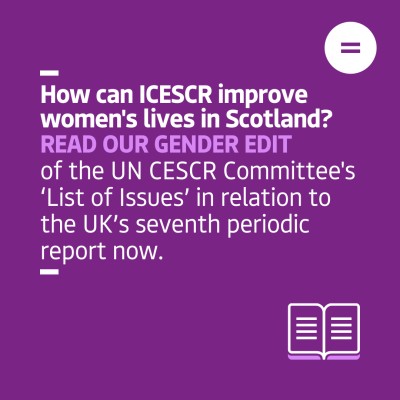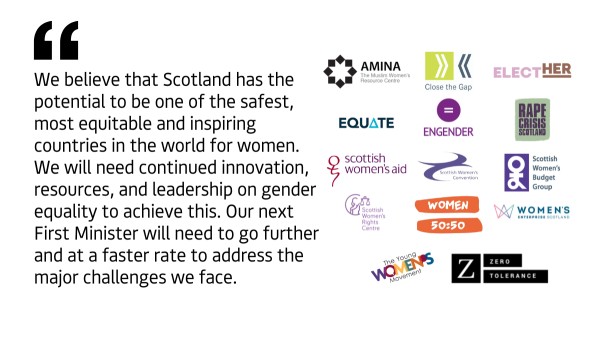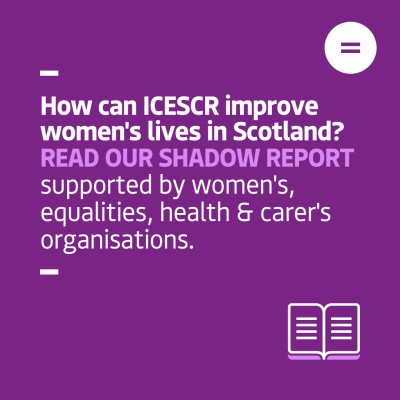Engender blog
New report reveals devastating impact of Covid-19 on access to pregnancy and maternity services
Engender and the Health and Social Care Alliance Scotland (the ALLIANCE) have today published a new report spotlighting women’s experiences of pregnancy and maternity services during the Covid-19 pandemic.
The report, ‘“Trauma, abandonment and isolation”: Experiences of pregnancy and maternity services in Scotland during Covid-19’, draws on survey responses from over 200 women across Scotland. It documents the profound and negative impact that public health restrictions had on access to vital healthcare across all aspects of these services from antenatal care, fertility treatment, to miscarriage and baby loss, birth and the postnatal period.
Key findings include:
- Confusing, contradictory and limited communication about Covid-19 mitigation measures caused extreme anxiety and distress for pregnant women.
- The shift away from in-person care to remote appointments was a barrier to adequate standards of care.
- Isolation as a result of restrictions negatively affected all aspects of pregnancy and maternity care. Women underwent invasive procedures, gave birth, and suffered miscarriage and baby loss without support, suffering trauma as a result.
- Inflexible and inconsistent application of guidelines across different health board areas and health settings led to uncertainty and perceptions of unfairness.
- A narrow focus on labour and delivery meant wider health needs were overlooked, including mental health and breastfeeding support.
- Gendered health inequalities, such as pain management and the lack of an intersectional approach, were exacerbated by the pandemic.
- Ongoing impacts include gaps in mental health support and experiences of trauma relating to isolation and poor care.
Jill Wood, Policy Manager at Engender, said:
“This research indicates that Covid-19 guidance and its application fundamentally failed to take account of women’s diverse needs and experiences during pregnancy and early motherhood. Confusing and contradictory communication, lack of in-person care and support, inflexible restrictions and inconsistent approaches across health board areas all undermined access to safe, dignified and quality healthcare.”
“The trauma caused by attending procedures and giving birth alone and the subsequent isolation, lack of support and adequate care, will stay with women long into the future."
"Scottish Government must learn from this, improve maternal health more broadly, and deliver on commitments on women’s health.”
Jane Miller, Academy Programme Manager at the ALLIANCE, said:
“Pregnancy and early parenthood can be challenging at the best of times. Our research shows that mitigation measures brought in during the pandemic exacerbated isolation and anxiety for many women in Scotland.”
“There is now an urgent need to centre the experiences and priorities of women in the ongoing Covid-19 Inquiry, and in the development of any future emergency guidance regarding healthcare. We must mitigate the risk of isolation and adopt flexible, person-centred approaches grounded in human rights and gender equality.”
A research participant said:
“It is essential that Scotland learns from people's experiences during the pandemic to improve maternity services and public health messaging. To do otherwise would be to fail, and further compound the trauma, of thousands of parents over the last few years.”
The report concludes with a series of recommendations aimed at the Scottish Covid-19 Inquiry and decision-makers in Scottish Government and health bodies. It highlights the need for a gendered and human rights approach to crisis management regarding healthcare, and for policy and services to take account of women’s particular experiences and needs at all life stages.
The report will be submitted as evidence to the Scottish Covid-19 Inquiry.
Read the report online here.
Apply now for our Board Pioneer Programme

Want to get involved in feminist governance and see how a board works? Find out more about our pilot Board Pioneer Programme in this blog.
Today we’re opening applications for Engender’s Board Pioneer Programme, a one-year opportunity to develop the skills and experience of someone who is interested in getting involved in feminist governance and finding out how a board works.
Our Board Pioneer will attend Engender’s board meetings over the course of a year, including our AGM, and get the chance to share their knowledge and expertise with our board, as well as building their networks within the women’s movement and contributing to Engender’s work for women’s equality in Scotland.
See the full advert and apply online here
Women's economic, social and cultural rights in Scotland

We recently submitted a shadow report, signed by 20 organisations, to the Seventh periodic report of the government of the United Kingdom on measures taken to give effect to ICESCR. In this blog, we share our gender edit of the List of Issues published by the CESCR Committee and take a look at some key issues raised.
The UN Committee on Economic Social and Cultural Rights is currently examining the UK on its performance under ICESCR (the International Covenant on Economic, Cultural, and Social rights). In 2022, the UK submitted its state party report (including input on devolved matters from Scottish Government), and the Committee received ‘shadow reports’ from civil society. Earlier this year we submitted a shadow report, co-signed by twenty organisations, which maps women’s rights in Scotland across the articles of ICESCR and highlights potential areas of focus for the Committee’s scrutiny. You can read more about our shadow report here.
Women's sector calls on candidates to go further on gender equality

Yesterday, we joined with organisations from across the Scottish Women's Sector to write to the SNP leadership candidates, calling on them to commit to bringing about progressive change on gender equality that benefits not only women, but Scottish society. Read the letter and see a full list of signatories below.
As Scotland’s national women’s equality organisations, our ambition is for a Scotland in which substantive, intersectional gender equality is finally realised. To secure this, we need an approach to government that puts the experiences of diverse women, particularly marginalised and minoritised women, at the core of public policy development and implementation. This requires innovation, resources, and leadership to ensure that all women benefit equitably from public investment and services, that our safety and human rights are realised, that we can participate fully in culture and public life, and that our unpaid care and paid work are valued and compensated fairly.
How can ICESCR impact women's human rights in Scotland?

Engender recently joined with women's, equalities, health and carer's organisations to submit our shadow report to the Seventh periodic report of the government of the United Kingdom on measures taken to give effect to ICESCR. In this blog, we take a look at our submission and how ICESCR can be a key tool for improving women's lives in Scotland.
For many years, Engender and other women’s equality advocates have been campaigning for the incorporation of the UN Convention on the Elimination of all forms of Discrimination Against Women (often known as the ‘women’s bill of rights’) into Scots Law, but CEDAW isn’t the only UN Convention which is essential when it comes to the protection of women’s equality and rights. The International Covenant on Economic, Social and Cultural Rights (ICESCR), which ensures the enjoyment of economic, social and cultural rights, was adopted in 1966.
Downloads
 Engender Briefing: Pension Credit Entitlement Changes
From 15 May 2019, new changes will be introduced which will require couples where one partner has reached state pension age and one has not (‘mixed age couples’) to claim universal credit (UC) instead of Pension Credit.
Engender Briefing: Pension Credit Entitlement Changes
From 15 May 2019, new changes will be introduced which will require couples where one partner has reached state pension age and one has not (‘mixed age couples’) to claim universal credit (UC) instead of Pension Credit.
 Engender Parliamentary Briefing: Condemnation of Misogyny, Racism, Harassment and Sexism
Engender welcomes this Scottish Parliament Debate on Condemnation of Misogyny, Racism, Harassment and Sexism and the opportunity to raise awareness of the ways in which women in Scotland’s inequality contributes to gender-based violence.
Engender Parliamentary Briefing: Condemnation of Misogyny, Racism, Harassment and Sexism
Engender welcomes this Scottish Parliament Debate on Condemnation of Misogyny, Racism, Harassment and Sexism and the opportunity to raise awareness of the ways in which women in Scotland’s inequality contributes to gender-based violence.
 Gender Matters in Social Security: Individual Payments of Universal Credit
A paper calling on the Scottish Government to automatically split payments of Universal Credit between couples, once this power is devolved to the Scottish Parliament.
Gender Matters in Social Security: Individual Payments of Universal Credit
A paper calling on the Scottish Government to automatically split payments of Universal Credit between couples, once this power is devolved to the Scottish Parliament.
 Gender Matters Manifesto: Twenty for 2016
This manifesto sets out measures that, with political will, can be taken over the next parliamentary term in pursuit of these goals.
Gender Matters Manifesto: Twenty for 2016
This manifesto sets out measures that, with political will, can be taken over the next parliamentary term in pursuit of these goals.
 Scottish NGO Briefing for UN Special Rapporteur on Violence Against Women
Joint briefing paper for the UN Rapporteur on Violence Against Women.
Scottish NGO Briefing for UN Special Rapporteur on Violence Against Women
Joint briefing paper for the UN Rapporteur on Violence Against Women.

Newsletter
Sign up to receive our newsletter here:
Sign up to our mailing list
Receive key feminist updates direct to your inbox: